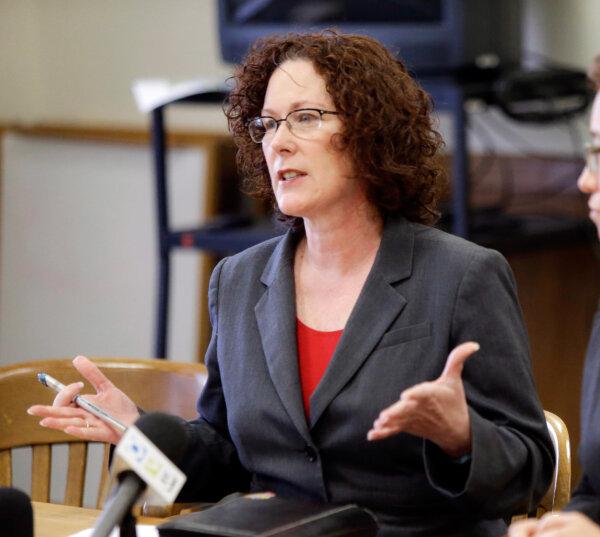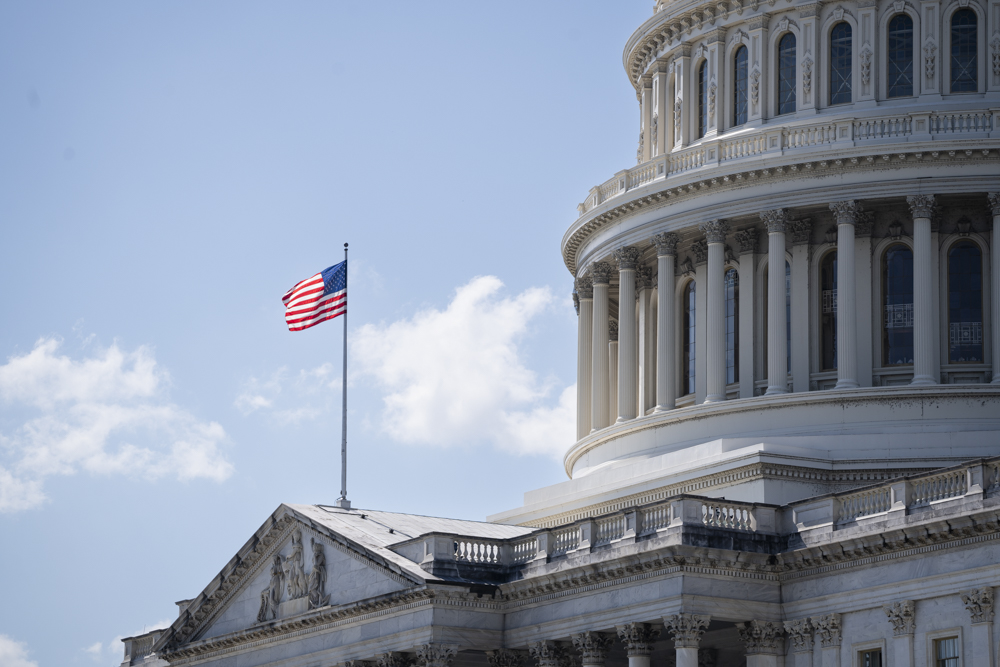Democratic Rep. Val Hoyle and GOP rival Monique DeSpain face off in the 4th District, which Republicans hope to turn red.
The freshman Democratic incumbent in Oregon’s 4th Congressional District and her Republican challenger clashed over approaches to abortion, homelessness, housing, and forest fires during debates in Coos Bay on Oct. 9 and Eugene on Oct. 11.
The main party candidates—Rep. Val Hoyle and rival Monique DeSpain—were joined by Justin Filip of the Pacific Green Party and Dan Bahlen, a Libertarian, for the Eugene debate.
The diverse district encompasses seven mostly rural counties, 250 miles of coastline, and the state’s two major University towns of Eugene and Corvallis.
The district has been in Democrat hands for nearly four decades and is considered likely Democrat by the Cook Political Report. Unaffiliated voters, who often vote for Democrats, make up 35 percent of registered voters, with Democrats at 32 percent and Republicans at 25 percent, according to the Oregon secretary of state’s office.
In 2022, voters chose Hoyle to succeed longtime Democratic Rep. Peter Defazio when he retired after 36 years in office. Hoyle defeated Republican Alek Sarlatos in that race by a margin of nearly 8 percent. President Joe Biden won the district in the presidential election in 2020.
Before her congressional run, Hoyle served in the Oregon legislature and was Oregon’s Bureau of Labor and Industry Commissioner. National Democrats acknowledged in May that Hoyle faces a tough race, adding her to its “Frontline” list of vulnerable incumbents.
Republicans hope to flip the seat to maintain their slim majority in the House. They consider Hoyle vulnerable because of questions about her prior leadership as labor commissioner and her connection with a cannabis firm that is under Department of Justice investigation.
Top challenger DeSpain is a former Air Force colonel whose 30 years of service included 20 years as a military attorney domestically and overseas. She later had a private practice in Oregon.
In July, the National Republican Congressional Committee added DeSpain to its “Young Guns” list, a designation for top challengers to Democratic representatives. The listing recognizes her campaign as one of the best in the country and an opportunity to flip the seat red.
DeSpain vowed to support law enforcement, secure the border, and stop the flow of illegal drugs, as well as emphasize accountability of the federal government.
Hoyle said she is running to “continue to bring Oregon taxpayer dollars back to our local communities to be invested in local priorities.”

Head to Head
The candidates aired their views on abortion, with DeSpain saying it should be left to states to decide. She also supports protecting access to in vitro fertilization, saying she used it to have her two sons.
Hoyle said she will work to codify the protections of Roe v. Wade. She touted her record of getting a handful of bills passed in her first term, despite what she called “the least productive” Congress, blaming Republicans for taking three weeks to choose a speaker.
“I’ve managed to pass five bills into law, each and every one bipartisan. I’ve been able to bring $86 million back to this district on things that matter, on infrastructure, on communications,” Hoyle said.
DeSpain then brought up an ongoing federal investigation into LaMota—a cannabis company that gave money to Democratic campaigns in Oregon—and its ties to Oregon Democrats, including Hoyle.
The U.S. Department of Justice has been investigating the case for more than a year.
Housing and Homelessness
Candidates drilled into Oregon’s housing and homelessness issues.
Oregon has a disproportionately large population of homeless people when compared with other states. While Oregon’s population represents 1.3 percent of the U.S. total, its homeless population is 2.6 percent of the total U.S. homeless population, according to a report by ECONorthwest.
If reelected, Hoyle said she would “approach the homeless problem with the values that we as Oregonians hold, to help those who need help and also provide a pathway for economic security.”
DeSpain wants to focus on accountability first in what she calls the “biggest crisis” in the state.
“We have about 2,000 nonprofits in Eugene alone that are allegedly serving this population,” DeSpain said.
Eugene, which is in the heart of the 4th District, has the nation’s highest homeless rate, 432 per 100,000 residents, among major cities.
“If they are not succeeding in getting people housed, then they shouldn’t get one more federal dollar,” DeSpain said.
Exacerbating Oregon’s homeless issue is a housing shortage. According to the National Low Income Housing Coalition, the state has a shortage of more than 102,700 affordable rental homes.
DeSpain said homebuilders are hamstrung by red tape and that permitting can account for up to a quarter of the cost of building a home. She said she would “get the government out of the way.”
Hoyle said she would create “an incentive to build new housing and expand Section 8 vouchers.” She would also continue to press for the development of the Coos Bay Port with an added rail line to aid in commerce.
“This will allow the south coast to be an economic engine again,” Hoyle said.
The incumbent said during her tenure, she has “brought money back to each community to pay for programs that the community prioritizes.”
In response, DeSpain said, “The solution is not always spending.”
The cost of housing could also be reduced with “common sense solutions, like supporting Oregon’s timber industry” so the lumber comes from home rather than being imported, DeSpain said.
DeSpain also linked the addiction crisis to homelessness and the border issues.
“The drug addiction problem is a big part of homelessness and mental health problems,” DeSpain said. “You don’t build a house and give the keys to a fentanyl addict courtesy of our tax dollars. That’s ridiculous.”
She called the fentanyl crisis a border security issue.
“Fentanyl is not sprouting along the sides of I-5,” DeSpain said. “It’s coming in over our unsecured borders, and it’s causing addiction, desperation, depression, and death, and these things are costing money.”
Forest Fires
Following another fire season in which nearly 3,000 square miles burned in Oregon, Hoyle called protecting forests “a priority” and said we “need to put more money up front to make sure there’s less to burn.”
“We are seeing the effects of climate change” with wildfires “at a size and scale not seen before,” Hoyle said. “We need to move away from fossil fuels in a way that makes sense.”
She said she expects natural disasters to get worse and proposed making the Federal Emergency Management Agency a Cabinet-level office.
DeSpain criticized the incumbent for failing to support the Fix Our Forests Act, HR 8790.
The bipartisan legislation would “encourage active forest management, support community resiliency to wildfires by expediting environmental analyses, reducing frivolous lawsuits and increasing the pace and scale of forest restoration projects,” according to a September press release by the House Committee on Natural Resources after the bill passed the House of Representatives.
“This is a critical issue to the 4th District, to Oregon, and the whole Northwest,” DeSpain said, adding that she would have supported the bill.
The 4th District is 85 percent forest, half of which is federally managed.
Hoyle said she did not vote for the act because it didn’t increase funding for wildland firefighter pay.

